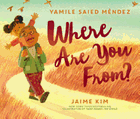
The question "Where are you from?" is all too familiar for many people of color who call the United States home. One little girl attempts to answer simply: "I'm from here, from today, same as everyone else." But the insistence lingers and the bewildered child can't satisfy her interrogators. She turns to her Abuelo "because he knows everything."
Abuelo takes her on an extraordinary journey to see the places, people, histories and experiences that make the girl who she is, identifying where she comes from and who her family and community are. "You're from the Pampas," Abuelo begins, "the open, free land." He points out "the brown river that cleanses and feeds the land"; he leads her high up in the mountains and down into the blue oceans; and tells her about "copper warriors," "island people" and "ancestors [who] built a home for all." Far and wide they wander, and yet, despite all his wondrous explanations, the little girl asks with grave persistence, "But, Abuelo... where am I really from?" With a finger pointed at his heart, he answers, "You're from here, from my love and the love of all those before us."
That intrusive "where are you from" scenario makes young children especially vulnerable to feeling unwelcome, question their sense of belonging and doubt their very identity. Yamile Saied Méndez (Blizzard Besties) counters with an enchanted, hand-in-hand odyssey through Abuelo and his granddaughter's richly diverse heritage. Artist Jamie Kim (Take Heart, My Child) uses watercolor and digital techniques to create vibrantly hued, double-page landscapes onto which she actively integrates Abuelo and granddaughter sharing the vastness of who they really are. From the Southern Cross to the North Star, "You are from all of us," Abuelo explains. And, finally, the little girl responds--and reclaims--"I am." --Terry Hong, Smithsonian BookDragon

